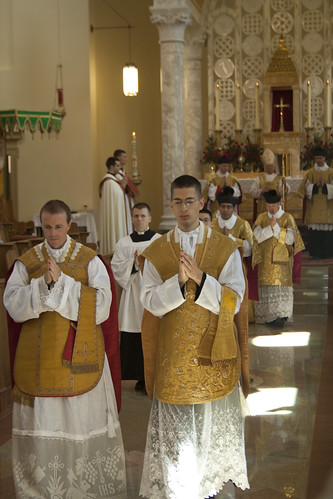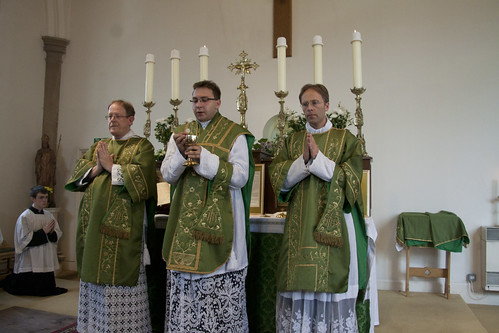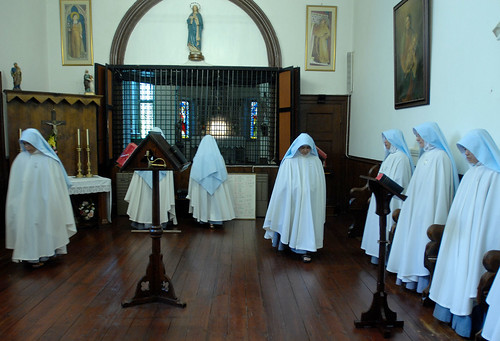 |
| Two newly ordained priests of the Fraternity of St Peter last year |
The time is overdue to admit married men to (shortened) formation and ordination. The faithful laity face the prospect of fewer churches and yet fewer priests. The priests themselves are service-weary and often confused, anxious and unwilling to address personally problematic matters. Whatever the challenges of securing a change, and then of implementing it, priests and people have a common interest in making the case not for allowing clergy to marry but for admitting the married to the clerical state. This implies two routes: celibates and married, with no opportunity for marriage or re-marriage once ordained (as is the case with permanent deacons), and, for reasons of exclusive commitment, only the celibate should be bishops.
I wrote a letter in reply as follows; it is in this weekend's edition.
 |
| Another newly ordained FSSP priest (centre), Fr Marek Graboski |
The policy fails for precisely the reason Prof. Haldane mentions: ordination is no longer the only route to a good education and lifestyle for most people. This means that there is nothing attractive to most young men about an undemanding clerical existence. The only way to attract them is by presenting them with a truly impressive clerical ideal. You only have to look where vocations today are going, both for the priesthood and the religious life, to see the point confirmed. Specifically, in the West, celibacy is central to the priestly ideal, since it underlines the priest's identification with Christ.
 |
| The Franciscan Sisters of the Immaculate at Lanherne, Cornwall |
The saddest thing about Haldane's article is that it shows that there are still thoughtful and intelligent people under 60 who are remain stuck in the post-Conciliar consensus, that the solution to every problem is to make concessions, to make things easier. If any policy has been tested to destruction, this one has. What happens when we make the priesthood about cosy self-fulfillment instead of self-sacrifice? We get fewer priests, because most young men are aware of simpler ways of pursuing cosy self-fulfillment. Shouldn't that be obvious?
The same is true for the laity. See the FIUV Position Paper on the Eucharistic Fast, which references some interesting research on how more demanding religions often attract more committment than lax ones. If you think about it, it makes sense. The researchers Mark van Vugt and Anjana Ahuja found this:
‘Paradoxically, the costlier the rituals associated with a belief system, the more enduring it is. One study of religious communes in 19th century America showed that those making the most extreme demands on their followers—giving up worldly goods, celibacy, shunning contact with outsiders, relinquishing certain foods and alcohol—were the most enduring.’
Perhaps very relevant not only to this issue of clerical celibacy but also to the other contended topics of fasting, contraception, divorce and remarriage, Latin in liturgy etc. is Dietrich Bonhoeffer's famous thesis 'The Cost of Discipleship' about the fraud of cheap grace. He does of course take a somewhat anti - institutional view of the church due to his Lutheranism. Yet nonetheless it is quite surprising that the defenses of Catholic orthodoxy and tradition hardly ever mention his very pertinent notion of the Christian faith as one of hard and costly grace, as opposed to the cheap grace of watered down Christianity 'adapting' to contemporary circumstances.
ReplyDeleteI agree totally with your response. Haldane's letter reminds me of a recent article in 'Catholic Herald' by Daphne McLeod when she seemed to dispute the drop in Mass attendance & blame we 'trads' for it. Yet in this week's same paper she presents the other side.
ReplyDeleteWe cannot & should not 'dumb down' our Faith which martyrs died for.
Anything worth having has to be worth working for, putting oneself out for. If it is made too easy it becomes worthless.
There is, of course, a very simple yet time consuming way of having more priests, more religious, more Faithful. We must ask God for them in prayer.
Married clergy? I'm mot sure where Prof Haldane has been, but we do have married clergy already - Permanent Deacons now being well established in the Roman rite, but also the convert clergy who include married priests.
ReplyDeleteHowever, to change the normal discipline of admitting only celibates to the priesthood would be disastrous for all the reasons you mention and more. The sacrifice, sign and witness which the demand of celibacy gives is a great grace both for the Church and to the world. It would be lost in a generation if the Church were to change the law. It is only human nature to follow the path of least resistance where it is available, and seminaries would be flooded with married candidates to the exclusion of celibates in no time at all.
That is to say nothing of the practical incompatibilities of the demands of priesthood and married life. The conflicts are bad enough in the diaconate, but in the presbyterate one or the other vocation would seriously suffer.
What we need is holy and orthodox priests - not married priests.
Do you think this group are getting any traction?
ReplyDeletehttp://acalltoaction.org.uk/
No! Do you? There is a very limited constituency for that kind of thing, and sympathisers are increasingly being replaced, in positions of authority, with opponents.
ReplyDeleteExcellent letter, Joe and spot on.
ReplyDeleteEvery Byzantine priest I know personally is a celibate. I hardly think that an allowance for married clergy would eradicate the celibate priesthood, anymore than third orders sap membership from monasteries.
ReplyDeleteA married cleric must have consent of his wife at ordination, so I assume necessary conditions of poverty would be embraced by mutual consent by husband and wife.
A married clergy opens up the path to ministry to those with a wider range of gifts. If the Easterners are not to be censured for following their legitimate traditions, then intrinsically there is nothing mutually contradictory about a call to marriage and a call to the priesthood, only circumstantially.
A lowering of standards? No one has what he has not received. A man whose vocation is marriage is specially suited to be holy as a married man. A man who is celibate is to be more intimately bound to higher things, but he, too, possesses the dispositions and inclinations to flourish in that state. This is about diversity of gifts, and it cannot be treated by a reductionism either to the one side or to the other.